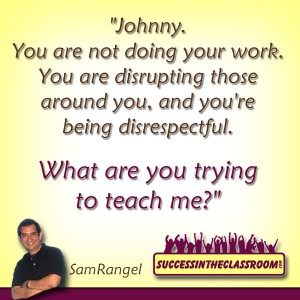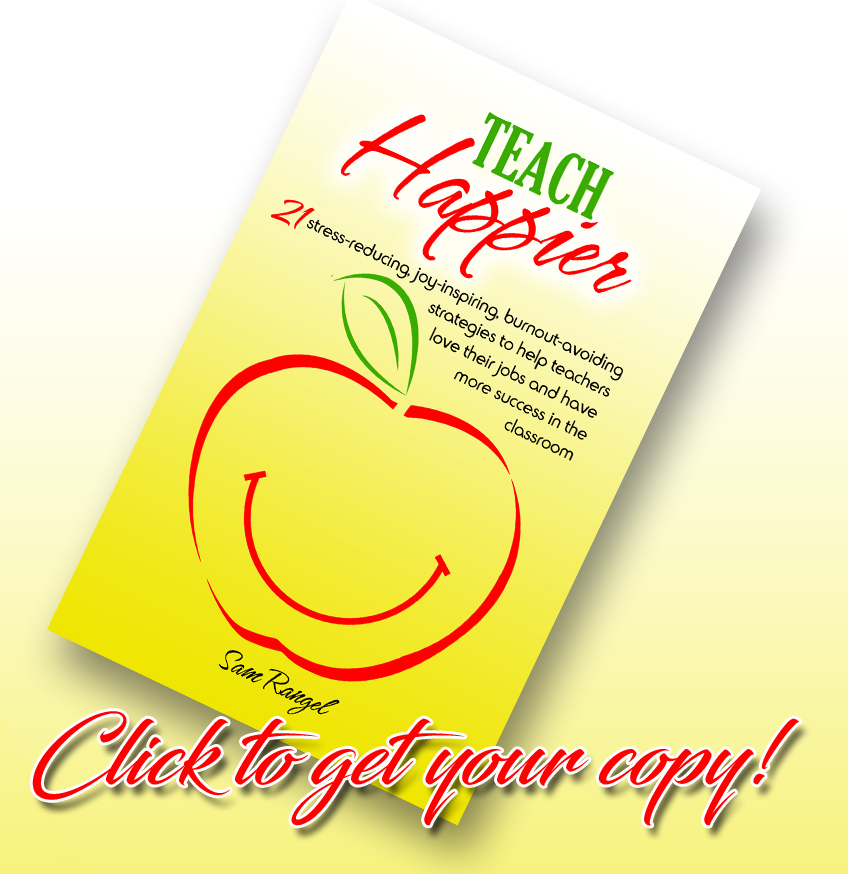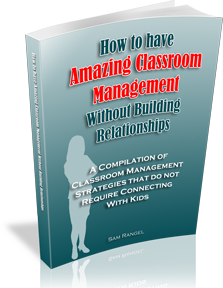I have been reading the book, Don’t Sweat the Small Stuff and It’s All Small Stuff: Simple Ways To Keep The Little Things From Taking Over Your Life by Richard Carlson, Ph.d.
In chapter eleven, he shares something that intrigued me, so I thought I’d share it here.
He offers a suggestion on how to avoid getting upset when other people do things that are making you frustrated or stressed out. As teachers, we find ourselves in these situations every day, especially if you are working with middle school kids like I do.
He asks us to assume that everybody else is more enlightened than we are. That is, the person, or in our case – the student, is actually trying to teach us a lesson with his/her behavior – because he/she is more enlightened than we are.
He gives the example of a slow-moving postal worker teaching us the lesson of patience.
I immediately thought how great this kind of thinking would help teachers who are getting frustrated because Johnny keeps disrupting the class.
How would we react differently, if we adopted Dr. Carlson’s point of view?
I know this is out there, but bear with me.
For example, Johnny is being Johnny, and he is disrupting the class, interrupting your lesson and being disrespectful.
Our first inclination is to take time to teach Johnny a lesson on proper classroom behavior.
We stop the class, and begin our lecture on respect, give our warnings, and if it continues, we hand out a consequence.
Many teachers do this.
I used to do this.
What Dr. Carlson in asking us to do is to imagine that Johnny is more enlightened than we are.
What? Yeah, I asked the same thing too, but let me try and explain.
Johnny is using his actions to try and teach us something, because he is more enlightened.
It reminds me of the movie, The Karate Kid, where Mr. Miyagi teaches Daniel (Ralph Macchio) how to fight by waxing his car. Say it with me, “Wax on…Wax off.”
In the movie, Daniel didn’t see what lesson Mr. Miyagi was trying to teach, so he got frustrated and upset.
If we imagine that Johnny is being a knucklehead on purpose to try and teach us how to be better teachers, what lessons would he want us to learn?
The importance of building better relationships with at-risk kids?
Taking more time to create engaging lesson plans?
Patience is a virtue?
How a negative home life can affect a student’s performance in school?
Once we see things from this perspective, we can then take action to demonstrate that we have learned these lessons, and hopefully avoid future “Johnny lessons.”
We can take time to build a better relationship with Johnny.
We can find out what motivates Johnny and incorporate it into the next lesson plan, so it’s more engaging.
We can be more patient by remembering that Johnny is only a kid.
We can make our classroom a safer and more positive place than Johnny’s home.
Many teachers are quick to place all blame for poor behavior on the student or his/her parents or on the school system, etc.
I believe that if we see Johnny as Mr. Miyagi trying to teach us something in his unorthodox teaching style, we would be less frustrated, and like Dr. Carlson suggests, less stressed.
What do you think?
How can we demonstrate to Johnny that we’ve learned his lesson?
I know this is a tough concept to grasp, but I would encourage you to give it a try.
The next time Johnny is being a knucklehead, say, “Johnny. You are not doing your work. You are disrupting those around you, and you’re being disrespectful. What are you trying to teach me?”
I think that would really confuse Johnny. I would love to be there to see it. 
This doesn’t mean we let Johnny keep disrupting our classes. We have to take action to stop him from keeping the other students in the class from learning, but perhaps if we see his actions more as a form of feedback, perhaps we won’t let it affect us as much.
Teaching can bring us some of the most rewarding moments of our lives. It can also bring us some of the most stressful moments of our lives.
If you are finding that your stresses are outnumbering your rewards, I would recommend you read Dr. Carlson’s book. It offers many strategies to help maintain a stress-less life.
Thank you again for all you do.
In spite of all the pressures and demands placed on you, you still give your best for our kids.
That is why you are amazing!
Until next time, here’s to your Success In The Classroom!
Thanks,
Sam
Don’t Sweat the Small Stuff and It’s All Small Stuff: Simple Ways To Keep The Little Things From Taking Over Your Life by Richard Carlson, Ph.d.




